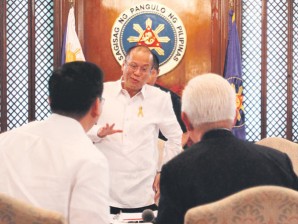Palace to field ARMM bets in 2013 polls

ARMM POLLS President Aquino meets Comelec Chairman Sixto Brillantes and Commissioner Christian Robert Lim to discuss voter registration at the ARMM in Malacañang on Wednesday. EDWIN BACASMAS
The administration will field candidates in next year’s midterm elections in the Autonomous Region in Muslim Mindanao (ARMM) and to make sure the elections will be clean, Malacañang wants the voter rolls in all of the region’s five provinces scrapped and replaced through a new registration of voters.
Speaking to reporters on Wednesday during a break in discussions in Malacañang of the government’s preparations for the midterms, President Benigno Aquino III said he would make sure his administration’s ARMM candidates would be “those who share the same vision that we do have.”
The administration candidates, he said, should not be “leader-centric” but “community centric.”
“What does that mean? You want to avoid people who will lend themselves to personality. It’s more of rather share the vision of what exactly should happen in the ARMM,” the President explained.
Neglected
Article continues after this advertisementHe underscored the need for leaders in the ARMM who will serve the people, who for many years have been “neglected” by their leaders.
Article continues after this advertisementThe efforts of the region’s past leadership, he said, “centered on the benefit of those in power rather than the vast majority of the populace.”
Mr. Aquino said it would not be difficult for him to find candidates for the ARMM elections, but for them to win the people’s mandate the electoral process in the region must first be reformed.
He said he believed the reforms could be done on his watch. Together with the Commission on Elections (Comelec), he said, “we think we can and [it can be] done.”
The first step is ditching the current voter lists and calling the people of the region to a new enrollment, a job for Comelec Chairman Sixto Brillantes who received from the President on Wednesday figures from the National Statistics Office (NSO) suggesting bloated population figures that would justify padded voter rolls.
Expensive exercise
It will be expensive—P430 million to P450 million, according to the Comelec—but Budget Secretary Florencio Abad said the government was willing to spend that much to clean up the voter rolls in Maguindanao, Lanao del Sur, Tawi-Tawi, Sulu and Basilan.
At Wednesday’s discussions, NSO Administrator Carmelita Ericta said the ARMM had a population of 4.1 million in 2007, but a revalidation of the figures in 2010 pegged the population at a little more than 3.3 million.
The region’s population growth rates are suspicious, too. Ericta said that while the entire country’s population grew by just 1.89 percent between 2000 and 2007, the ARMM reported a growth rate of 5.46 percent. Maguindanao had the biggest growth rate, 6.6 percent, followed by Basilan, 6.44 percent.
“What else can you conclude from [those] statistics that the National Statistics Office . . . presented to us? That’s really an unbelievable situation,” Abad said.
Tight schedule
Brillantes told reporters that the new voter registration would have to be completed by December so that the Comelec could start printing ballots in January, as scheduled. That is a tight schedule and the Comelec will be hard pressed to meet it, Brillantes said.
The Comelec was to meet yesterday afternoon to decide whether calling a new, general registration was feasible, Brillantes said. An alternative would be selective registration in all the five provinces, but ARMM Officer-in-Charge Mujiv Hataman said this might give the impression that the administration is “engaging in politicking by being selective.” He said the regional government preferred a general registration of voters.
Abad said the administration wanted a general registration to show how serious it was about cleansing the voting process. “We recognize the independence of the Comelec as a separate constitutional [body], but we are making the appeal to them to make the extra sacrifice,” Abad said.
The administration is not yet into candidate selection, as it wants reforms to come first, he added. And there is no lobbying yet for the administration’s ARMM ticket.